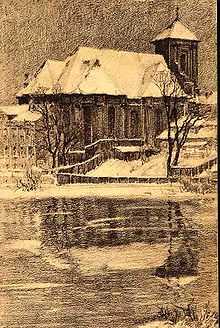Burgkirche (Königsberg)


The Burgkirche was a Protestant church in Königsberg, Germany.
The first Calvinist service in Königsberg was performed in 1616 by Johann Crocius in a hall of Königsberg Castle. In 1662 Frederick William, the Great Elector, ordered the building of a new Reformed church and school in the Burgfreiheit district near the castle, granting land near a slaughterhouse. The transfer of land only occurred in 1665, however, and the initiative was halted until the 1680s.
In 1687 the court expanded the grounds for the church by purchasing a garden north of the former slaughterhouse from Oberburggraf Ahasverus von Lehndorff. The new church was built from 1690–96; Johann Arnold Nering modeled it after the Nieuwe Kerk in The Hague. It was dedicated in the presence of King Frederick I on 23 January 1701. By 1819 the German reformed church was known simply as the Burgkirche (castle church).
The wooden vault of the nave was covered with stucco, and only the apses had a stellar vault. The pulpit was on the long side of the nave covered with a crown. The organ was the work of Johann Josua Mosengel and was, like many organs in Konigsberg, decorated with the Prussian eagle. Commissioned by commerce official Charles Cabrit, the church's portal was designed in 1727 with allegorical sandstone figures of justice, love and, charity.
Between 1817 and 1945 the congregation formed part of the Evangelical Church in Prussia, a church body comprising Reformed, Lutheran and United Protestant congregations. The church was severely damaged by the 1944 Bombing of Königsberg during World War II. The remnants were demolished by the Soviet administration in Kaliningrad in 1969.
External links
| Wikimedia Commons has media related to Burgkirche (Königsberg). |
References
- Bötticher, Adolf (1897). Die Bau- und Kunstdenkmäler der Provinz Ostpreußen. Heft VII. Königsberg (in German). Königsberg: Rautenberg. p. 395.
- Mühlpfordt, Herbert Meinhard (1972). Königsberg von A bis Z (in German). München: Aufstieg-Verlag. p. 168. ISBN 3-7612-0092-7.
Coordinates: 54°42′44″N 20°30′58″E / 54.71222°N 20.51611°E